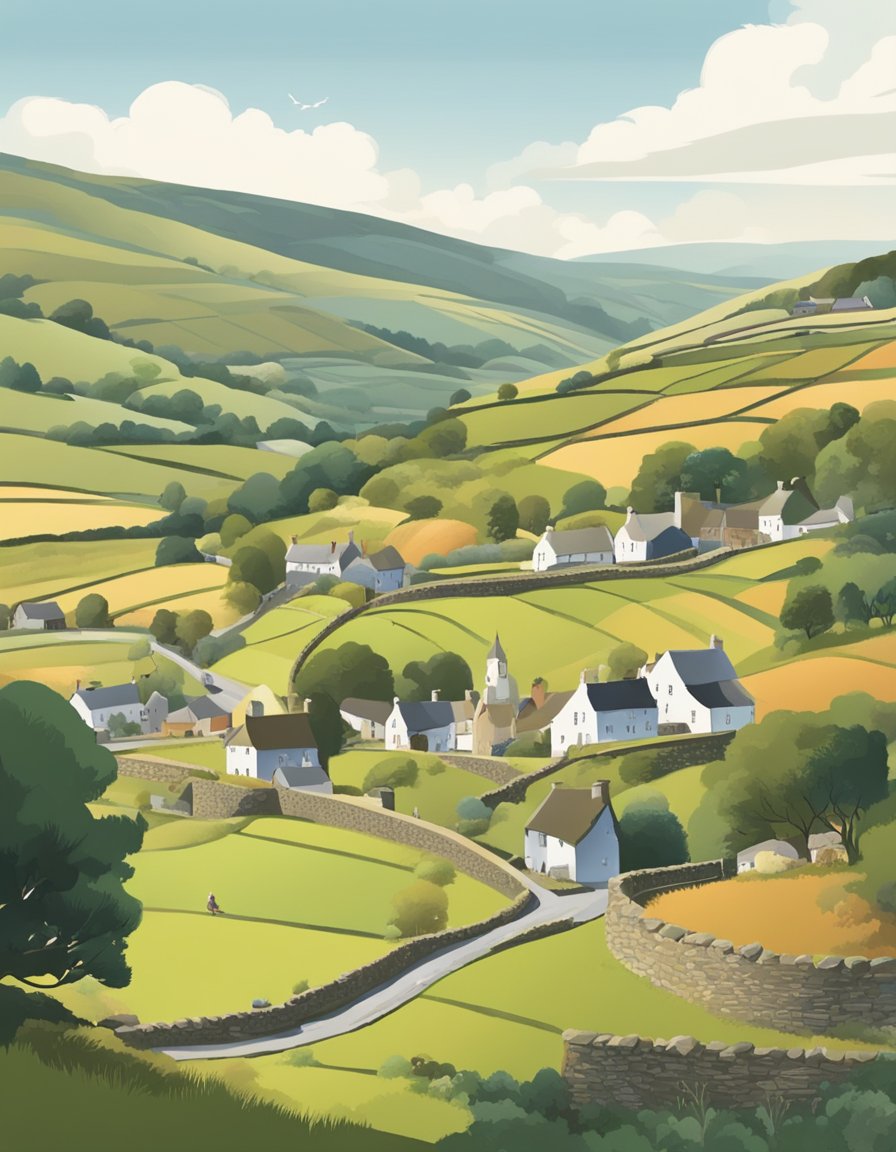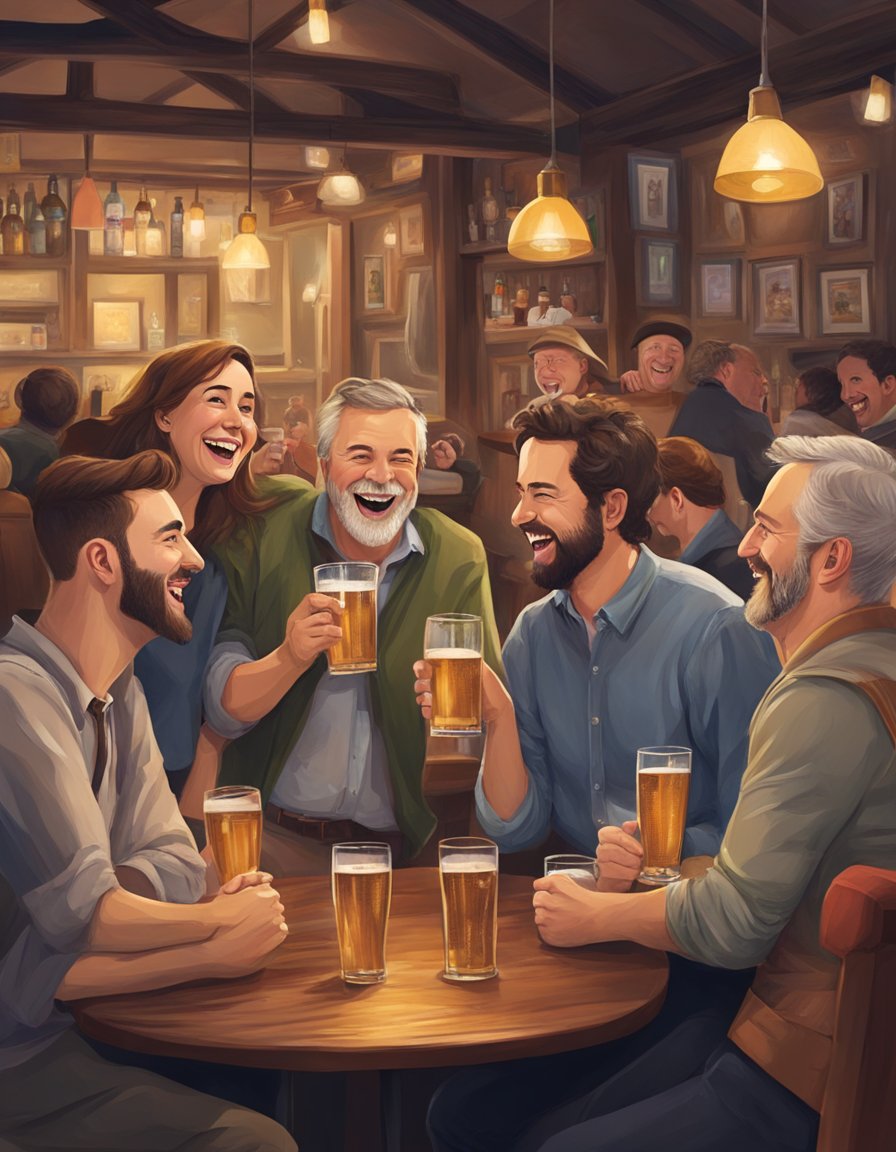Welsh Endearments: A Guide to Expressing Affection in Wales
Welsh terms of endearment are a unique and charming aspect of the Welsh language. These terms are used to express affection and love towards loved ones, partners, children, and friends. They can be used to create a sense of closeness and intimacy in relationships.

The Welsh language is known for its poetic and romantic qualities, which are reflected in the terms of endearment used by Welsh speakers. Some of the most common terms of endearment in Welsh include "annwyl", which means "dear, darling, beloved, loved, cherished, favourite; precious, choice, chosen, pleasant, lovely; loved one, friend". Another common term is "anwylyd", which means "dearest". These terms can be combined with "fy" (my) to create phrases such as "fy anwylyd" (my dearest) and "fy annwyl un" (my dear one).
Overall, Welsh endearments are a beautiful and meaningful way to express love and affection towards those closest to us. They are an important part of Welsh culture and language, and provide a glimpse into the poetic and romantic nature of the Welsh people.
Understanding Welsh Terms of Endearment

As we delve into the world of Welsh terms of endearment, we find that the Welsh language has a rich and unique vocabulary when it comes to expressing love and affection towards family members, friends, and loved ones.
One of the most commonly used Welsh terms of endearment is "Cariad", which means "love" or "sweetheart". This term is often used as a nickname for partners, children, and friends. It is also common to hear variations of "Cariad" such as "Fy nghariad" (my love) and "Cariad aur" (precious love/darling).
Another popular Welsh term of endearment is "Annwyl", which translates to "dear, darling, beloved, loved, cherished, favourite; precious, choice, chosen, pleasant, lovely; loved one, friend". This term is often used to express deep affection and love towards someone special. Variations of "Annwyl" include "Fy anwylyd" (my dearest) and "Fy annwyl un" (my beloved one).
Welsh terms of endearment also include animal-related words such as "Cyw" (chick), which can be used as a general term of endearment, especially towards a child or young woman. It can also be used when hitting on a woman (though it may sound sleazy). Another animal-related term is "Cwtch" (cuddle), which is a Welsh word for a warm, affectionate hug.
In conclusion, Welsh terms of endearment are a unique and special way to express love and affection towards those we care about. They provide a glimpse into the Welsh language and culture, and are a wonderful way to connect with loved ones.
Commonly Used Welsh Terms of Endearment
When it comes to expressing affection, Welsh language has a rich vocabulary of terms of endearment that are commonly used. In this section, we will explore some of the most commonly used Welsh endearments that are used to express love and affection.
Cariad
Cariad is probably the most commonly used term of endearment in Welsh. This word means "love, charity, affection; beloved one, lover, sweetheart, darling". There are many variations of this word, including cariad aur (precious darling), cariad bach (little darling), fy nghariad (my darling), fy nghariad aur (my golden darling), fy nghariad gwyn (my white darling), and fy nghariad bach (my little darling).
Annwyl
Annwyl is another commonly used Welsh term of endearment that means "dear, beloved". This word is often used as a term of endearment for family members, friends, and romantic partners.
Bach
Bach is a term of endearment that is often added to names to express affection. It means "small, little, short, dear". For example, Osian bach (little Osian) or fy mach i (my little one). This word can also be mutated to mach following fy, so fy + bach = Fy mach.
Blodyn
Blodyn is a Welsh word that means "flower". This term of endearment is often used to describe someone who is cute and lovely, just like a flower.
Del
Del is a Welsh term of endearment that means "pretty, cute, lovely". This word is often used to describe someone who is attractive and charming.
Overall, Welsh language has a rich vocabulary of terms of endearment that are commonly used to express love and affection. Whether you are looking for a cute nickname or a sweet expression of affection, Welsh language has something for everyone.
Expressions of Love in Welsh

Welsh is a language full of rich and beautiful expressions of love. Whether you want to express your love to a romantic partner, a family member, or a friend, there are plenty of Welsh phrases that can help you do so.
One of the most common ways to express love in Welsh is by using the phrase "Rwy'n dy garu di." This translates as I love you in Welsh and is a simple yet powerful way to express your feelings. Another popular phrase is "Cariad," which means "love" and can be used as a term of endearment.
If you want to express your love in a more formal or poetic way, there are plenty of options available. For example, you could use the phrase "Rwy'n dy garu di yn fwy na dim arall yn y byd," which means "I love you more than anything else in the world." This is a beautiful and heartfelt expression of love that is sure to make your loved one feel special.
In addition to these phrases, there are many other expressions of love in Welsh that can be used to convey your feelings. For example, you could say "Fy anwylyd," which means "my dearest," or "Fy annwyl un," which means "my dear one." These phrases are more formal and are often used in writing rather than speech.
Overall, Welsh is a language full of beautiful expressions of love that can help you convey your feelings to those you care about. Whether you are looking for a simple phrase to express your love or a more poetic expression, there are plenty of options available in Welsh.
Variations and Pronunciations
When it comes to Welsh terms of endearment, there are various regional variations and pronunciations. In this section, we will explore some of the most common ones.
Regional Variations
As with any language, Welsh has regional variations in terms of its vocabulary and pronunciation. For example, in North Wales, the term "cariad" is often used as a term of endearment, which translates to "love" in English. In South Wales, on the other hand, "cwtch" is a popular term of endearment, which means "cuddle" or "hug".
Pronunciation Guide
Welsh pronunciation can be challenging for those who are not familiar with the language. Here are some tips to help you pronounce Welsh terms of endearment correctly:
- "Cariad": pronounced as "KA-ree-ad"
- "Cwtch": pronounced as "kootch"
- "Hun": pronounced as "heen"
- "Annwyl": pronounced as "AN-oo-eel"
- "Cariad bach": pronounced as "KA-ree-ad bach"
Variations Include
Other variations of Welsh terms of endearment include "cariadig" (loving), "cwtchy" (cuddly), "cariadon" (lovers), and "cariadon bach" (little lovers). It's worth noting that these terms are often used in informal situations, such as between couples or close friends.
Welsh terms of endearment are a unique and charming aspect of the Welsh language. By understanding the regional variations and pronunciation, you can better appreciate the beauty of these terms and use them to show your affection towards your loved ones.
Usage in Popular Culture

In pop culture, Welsh terms of endearment have been featured in various media, including television shows and movies. One popular example is the British sitcom Gavin and Stacey, which features several Welsh characters who use terms of endearment throughout the show. The show has helped to popularize Welsh terms of endearment among non-Welsh speakers and has even made some of these terms a conversation starter.
For instance, the term "cariad" is frequently used in Gavin and Stacey to address loved ones, and it has become a well-known Welsh term of endearment. The show has also popularized the use of "bach" as a suffix to add endearment to a name, such as "Nessa bach" or "Stacey bach."
Outside of television, Welsh terms of endearment are also used in popular Welsh music. The Welsh language band Super Furry Animals has a song titled "Cwtch" which means "hug" or "cuddle" in Welsh. The song features lyrics such as "Cwtch me, cwtch me, cwtch me tonight" and has become a popular Welsh term of endearment.
Overall, Welsh terms of endearment have become more mainstream in pop culture, and they are often used to convey affection and intimacy. These terms can be a fun and unique way to express love and endearment towards a loved one.
Learning Welsh

If you're interested in learning Welsh, you're in luck! Welsh is a beautiful and unique language with a rich history and culture. Here are some tips to get started:
New Welsh
If you're new to Welsh, welcome! You're about to embark on an exciting journey of learning a new language. Welsh is a Celtic language spoken in Wales, and it has a unique alphabet and pronunciation. Don't be intimidated by this, though. With practice, you'll get the hang of it.
Welsh Language
Welsh is a beautiful language that is spoken by around 750,000 people worldwide. It has a rich history and culture, and learning Welsh can help you connect with this heritage. The language is also spoken in parts of Patagonia, Argentina, and there are Welsh language classes and groups all over the world.
Welsh Phrases
Learning Welsh phrases can be a great way to get started with the language. Here are a few useful ones to get you started:
- Bore da meaning "Good morning"
- Pwy ydych chi? (Who are you?)
- Croeso (Welcome)
- Diolch (Thank you)
- Hwyl fawr (Goodbye)
Vocabulary
Learning vocabulary is an important part of learning any language. Here are a few Welsh words to get you started:
- Cwtch (Hug)
- Cariad (Love)
- Anwylyd (Dearest)
- Fy annwyl un (My dear one)
Alphabet
The Welsh alphabet is unique and has 28 letters, including some that are not found in the English alphabet. Here are the letters and their pronunciations:
- A (ah)
- B (buh)
- C (kuh)
- Ch (kh)
- D (duh)
- Dd (th)
- E (eh)
- F (vuh)
- Ff (f)
- G (guh)
- Ng (ng)
- H (huh)
- I (ee)
- L (luh)
- Ll (thl)
- M (muh)
- N (nuh)
- O (oh)
- P (puh)
- Ph (f)
- R (ruh)
- Rh (hr)
- S (suh)
- T (tuh)
- Th (th)
- U (ih)
- W (oo)
- Y (uh)
Useful Phrases
Here are a few more useful Welsh phrases to help you get started:
- Mae'n ddrwg gen i (I'm sorry)
- Dw i'n hoffi coffi (I like coffee)
- Ble mae'r tŷ bach? (Where is the bathroom?)
- Mae hi'n bwrw glaw (It's raining)
Speaker
If you're looking for someone to practice Welsh with, there are many Welsh language classes and groups all over the world. You can also find Welsh speakers online or in your local community. Don't be afraid to reach out and start practicing!
The Significance of Welsh Terms of Endearment
Welsh terms of endearment are an important part of the Welsh language and culture. They are used to express affection, love, and fondness towards loved ones, family, and friends. In Wales, these terms are commonly used in both speech and writing, and they have a special significance in Welsh culture.
The Welsh language is known for its rich and expressive vocabulary, and its terms of endearment are no exception. The Welsh language has several words that mean "love," including "cariad," which is one of the most commonly used terms of endearment in Welsh. It is used to express love and affection towards a loved one, and it can be used in both formal and informal situations.
In Welsh, terms of endearment can also be used to refer to someone as "my" or "dear," such as "fy annwyl" (my dear) or "annwyl un" (dear one). These terms are used to express fondness and affection towards someone, and they are often used in intimate or romantic relationships.
Welsh terms of endearment are also used to refer to loved ones, such as "fy nghariad" (my love) or "fy anwylyd" (my beloved). These terms are used to express deep affection and love towards someone, and they are often used in romantic relationships or between family members.
Overall, Welsh terms of endearment are an important part of Welsh culture and language. They are used to express affection, love, and fondness towards loved ones, and they have a special significance in Welsh culture. If you're ever in Wales, you'd definitely want to learn some of these terms to show your loved ones how much you care about them!
Frequently Asked Questions
Q: How do you say I love you in Welsh?
A: "Dwi'n dy garu di"
Q: What is the Welsh word for love?
A: "Caru" or if you're referring to a person as a greeting or compliment then this could be "cariad"
Q: What are some common terms of endearment in Welsh?
A: Some common Welsh terms of endearment include "caru," "cariad," "annwyl," and "cwtch."
Q: How do you say "darling" in Welsh?
A: The Welsh word for "darling" is "cariad."
Q: What is the meaning of the Welsh word "aur" when used to express affection?
A: The word "aur" in Welsh means "gold," and it is often used as a term of endearment to express the value of the person being addressed.
Q: Can you provide a popular Welsh love quote?
A: One popular Welsh love quote is "Dwi'n dy garu di" which means I love you in Welsh.
Q: How is the term "tatws" used in Welsh terms of endearment?
A: In Welsh, "tatws" (potato) is used as a term of endearment to refer to someone as a cute or endearing individual.
Q: What is the Welsh term for "sweet one"?
A: The Welsh term for "sweet one" is "tatws," which is an affectionate and endearing way to refer to someone.
Q: Is "gwas" a popular Welsh endearment?
A: Yes, "gwas" is a popular Welsh term of endearment, which translates to "lad" or "youth" and is used frequently to express affection.
Q: How do you express love and affection in Welsh?
A: You can express love and affection in Welsh by using terms such as "cariad," "annwyl," "cwtch," and other endearing words in conversations and interactions.
Q: Can you provide an example of a Welsh love quote and its translation?
A: An example of a Welsh love quote is "Rwy'n dy garu di'n fawr iawn" (I love you very much), which showcases the expression of deep affection in Welsh.
Q: How is the term "gwas" used in Welsh tradition to express affection?
A: The term "gwas" is used in Welsh tradition as a casual and endearing way to refer to someone, often reflecting a sense of familiarity and affection.